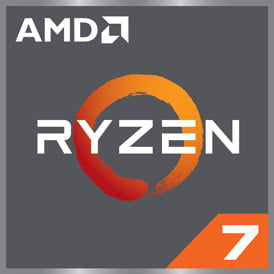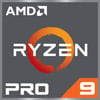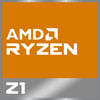
AMD Ryzen 7 7840U Benchmark, Test and specs
Last updated:
The AMD Ryzen 7 7840U is a 8 core processor. It can handle 16 threads simultaneously and was introduced in Q2/2023. The AMD Ryzen 7 7840U is based on the 6. generation of the AMD Ryzen 7 series and requires a mainboard with the socket FP8. The AMD Ryzen 7 7840U scores 1,850 points with one CPU core in the Geekbench 5 benchmark. When using all CPU cores, the result is 9,612 points.

| Name: | AMD Ryzen 7 7840U |
|---|---|
| Family: | AMD Ryzen 7 (67) |
| CPU group: | AMD Ryzen 7040 (21) |
| Architecture: | Phoenix (Zen 4) |
| Segment: | Mobile |
| Generation: | 6 |
| Predecessor: | -- |
| Successor: | AMD Ryzen 7 8840U |
CPU Cores and Base Frequency
The 8 CPU cores of the AMD Ryzen 7 7840U clock with 3.30 GHz (5.10 GHz). The number of CPU cores and the clock frequency of the processor are largely responsible for the overall performance.
| CPU Cores / Threads: | 8 / 16 |
|---|---|
| Core architecture: | normal |
| Cores: | 8x Zen 4 |
| Hyperthreading / SMT: | Yes |
|---|---|
| Overclocking: | No |
| Frequency: | 3.30 GHz |
| Turbo Frequency (1 Core): | 5.10 GHz |
| Turbo Frequency (8 Cores): | -- |
Artificial Intelligence and Machine Learning
Processors with the support of artificial intelligence (AI) and machine learning (ML) can process many calculations, especially audio, image and video processing, much faster than classic processors. Algorithms for ML improve their performance the more data they have collected via software. ML tasks can be processed up to 10,000 times faster than with a classic processor.
| AI hardware: | AMD Ryzen AI |
|---|---|
| AI specifications: | AMD dedicated AI XDNA Technology |
Internal Graphics
With the AMD Radeon 780M, the AMD Ryzen 7 7840U has an build in graphic solution. It has 12 SM processors, which have a total of 768 texture shaders. The iGPU not only enables games, but also significantly accelerates video playback.
| GPU name: | AMD Radeon 780M |
|---|---|
| GPU frequency: | 0.80 GHz |
| GPU (Turbo): | 2.70 GHz |
| Compute units: | 12 |
| Shader: | 768 |
| Hardware Raytracing: | Yes |
| Release date: | Q1/2023 |
| Max. displays: | 4 |
|---|---|
| Generation: | 3 |
| Direct X: | 12 |
| Technology: | 4 nm |
| Max. GPU Memory: | 32 GB |
| Frame Generation: | AMD FSR |
Hardware codec support
Processors that have an integrated graphics can play videos faster and more efficiently. This can have a positive effect on the battery life of notebooks, for example.
| h265 / HEVC (8 bit): | Decode / Encode |
|---|---|
| h265 / HEVC (10 bit): | Decode / Encode |
| h264: | Decode / Encode |
| VP8: | Decode |
| VP9: | Decode |
| AV1: | Decode / Encode |
|---|---|
| AVC: | Decode |
| VC-1: | Decode |
| JPEG: | Decode / Encode |
Memory & PCIeThe AMD Ryzen 7 7840U supports up to 256 GB memory in up to 2 (Dual Channel) memory channels. This results in a maximum memory bandwidth of 120.0 GB/s. |
|
| Memory type: | Memory bandwidth: |
|---|---|
| DDR5-4800 DDR5-5600 LPDDR5-6400 LPDDR5X-7500 | 76.8 GB/s 89.6 GB/s 102.4 GB/s 120.0 GB/s |
| Max. Memory: | 256 GB |
| Memory channels: | 2 (Dual Channel) |
| ECC: | Yes |
| PCIe: | 4.0 x 20 |
| PCIe Bandwidth: | 39.4 GB/s |
Thermal ManagementWith the TDP, the processor manufacturer specifies the cooling solution required for the processor. The AMD Ryzen 7 7840U has a TDP of 28 W. |
|
|---|---|
| TDP (PL1 / PBP): | 28 W |
| TDP (PL2): | -- |
| TDP up: | 30 W |
| TDP down: | 15 W |
| Tjunction max.: | 100 °C |
Technical details
The AMD Ryzen 7 7840U has a 24.00 MB large cache. The processor is manufactured in 4 nm. Modern production increases the efficiency of the processor.
| Technology: | 4 nm |
|---|---|
| Chip design: | Monolithic |
| Socket: | FP8 |
| L2-Cache: | 8.00 MB |
| L3-Cache: | 16.00 MB |
| AES-NI: | Yes |
| Operating systems: | Windows 10, Windows 11, Linux |
| Virtualization: | AMD-V, SVM |
|---|---|
| Instruction set (ISA): | x86-64 (64 bit) |
| ISA extensions: | SSE4a, SSE4.1, SSE4.2,FMA3, AVX2, AVX512 |
| Release date: | Q2/2023 |
| Release price: | -- |
| Part Number: | -- |
| Documents: | Technical data sheet |
Rate this processor
Benchmark results

The benchmark results for the AMD Ryzen 7 7840U have been carefully checked by us. We only publish benchmark results that have been created by us or that have been submitted by a visitor and then checked by a team member. All results are based on and fullfill our benchmark guidelines.
Cinebench R23 (Single-Core)
Cinebench R23 is the successor of Cinebench R20 and is also based on the Cinema 4 Suite. Cinema 4 is a worldwide used software to create 3D forms. The single-core test only uses one CPU core, the amount of cores or hyperthreading ability doesn't count.

|
AMD Ryzen 7 7840H
8C 16T @ 5.10 GHz |
||

|
AMD Ryzen 7 7840HS
8C 16T @ 5.10 GHz |
||

|
AMD Ryzen 7 PRO 7840HS
8C 16T @ 5.10 GHz |
||
|
|
AMD Ryzen 7 7840U
8C 16T @ 5.10 GHz |
||

|
AMD Ryzen 7 PRO 7840U
8C 16T @ 5.10 GHz |
||

|
Intel Core i3-13100F
4C 8T @ 4.50 GHz |
||

|
Intel Core i3-13100
4C 8T @ 4.50 GHz |
||
Cinebench R23 (Multi-Core)
Cinebench R23 is the successor of Cinebench R20 and is also based on the Cinema 4 Suite. Cinema 4 is a worldwide used software to create 3D forms. The multi-core test involves all CPU cores and taks a big advantage of hyperthreading.

|
AMD Ryzen 7 PRO 7840U
8C 16T @ 3.30 GHz |
||

|
Intel Core i7-1280P
14C 20T @ 3.00 GHz |
||

|
AMD Ryzen 9 5980HX
8C 16T @ 4.40 GHz |
||
|
|
AMD Ryzen 7 7840U
8C 16T @ 3.30 GHz |
||

|
AMD Ryzen 7 PRO 8840U
8C 16T @ 3.30 GHz |
||

|
AMD Ryzen 7 8840U
8C 16T @ 3.30 GHz |
||

|
AMD Ryzen 7 PRO 6850U
8C 16T @ 2.70 GHz |
||
Geekbench 5, 64bit (Single-Core)
Geekbench 5 is a cross plattform benchmark that heavily uses the systems memory. A fast memory will push the result a lot. The single-core test only uses one CPU core, the amount of cores or hyperthreading ability doesn't count.

|
Intel Xeon W-1370P
8C 16T @ 5.20 GHz |
||

|
Intel Core i5-12600K
10C 16T @ 4.90 GHz |
||

|
Intel Core i5-12600KF
10C 16T @ 4.90 GHz |
||
|
|
AMD Ryzen 7 7840U
8C 16T @ 5.10 GHz |
||

|
AMD Ryzen 7 PRO 7840U
8C 16T @ 5.10 GHz |
||

|
Intel Core i5-13600
14C 20T @ 5.00 GHz |
||

|
Intel Core i5-14400F
10C 16T @ 4.70 GHz |
||
Geekbench 5, 64bit (Multi-Core)
Geekbench 5 is a cross plattform benchmark that heavily uses the systems memory. A fast memory will push the result a lot. The multi-core test involves all CPU cores and taks a big advantage of hyperthreading.

|
Intel Core i9-11900
8C 16T @ 3.80 GHz |
||

|
Intel Xeon E5-2680 v3
12C 24T @ 2.90 GHz |
||

|
Intel Xeon E5-2695 v3
14C 28T @ 2.80 GHz |
||
|
|
AMD Ryzen 7 7840U
8C 16T @ 3.30 GHz |
||

|
AMD Ryzen 7 PRO 8840U
8C 16T @ 3.30 GHz |
||

|
AMD Ryzen 7 8840U
8C 16T @ 3.30 GHz |
||

|
AMD Ryzen 7 PRO 7840U
8C 16T @ 3.30 GHz |
||
Geekbench 6 (Single-Core)
Geekbench 6 is a benchmark for modern computers, notebooks and smartphones. What is new is an optimized utilization of newer CPU architectures, e.g. based on the big.LITTLE concept and combining CPU cores of different sizes. The single-core benchmark only evaluates the performance of the fastest CPU core, the number of CPU cores in a processor is irrelevant here.

|
AMD Ryzen 7 7840HS
8C 16T @ 5.10 GHz |
||

|
AMD Ryzen 7 PRO 7840HS
8C 16T @ 5.10 GHz |
||

|
Intel Core i5-14500HX
14C 20T @ 4.90 GHz |
||
|
|
AMD Ryzen 7 7840U
8C 16T @ 5.10 GHz |
||

|
AMD Ryzen 7 PRO 8840U
8C 16T @ 5.10 GHz |
||

|
AMD Ryzen 7 8840U
8C 16T @ 5.10 GHz |
||

|
AMD Ryzen 7 PRO 7840U
8C 16T @ 5.10 GHz |
||
Geekbench 6 (Multi-Core)
Geekbench 6 is a benchmark for modern computers, notebooks and smartphones. What is new is an optimized utilization of newer CPU architectures, e.g. based on the big.LITTLE concept and combining CPU cores of different sizes. The multi-core benchmark evaluates the performance of all of the processor's CPU cores. Virtual thread improvements such as AMD SMT or Intel's Hyper-Threading have a positive impact on the benchmark result.

|
AMD Ryzen 7 5700X
8C 16T @ 4.20 GHz |
||

|
Intel Core i7-11700K
8C 16T @ 4.50 GHz |
||

|
Intel Core i7-11700KF
8C 16T @ 4.50 GHz |
||
|
|
AMD Ryzen 7 7840U
8C 16T @ 3.30 GHz |
||

|
AMD Ryzen 7 PRO 8840U
8C 16T @ 3.30 GHz |
||

|
AMD Ryzen 7 8840U
8C 16T @ 3.30 GHz |
||

|
AMD Ryzen 7 PRO 7840U
8C 16T @ 3.30 GHz |
||
iGPU - FP32 Performance (Single-precision GFLOPS)
The theoretical computing performance of the internal graphics unit of the processor with simple accuracy (32 bit) in GFLOPS. GFLOPS indicates how many billion floating point operations the iGPU can perform per second.

|
AMD Ryzen 9 7940H
AMD Radeon 780M @ 2.80 GHz |
||

|
AMD Ryzen 9 7940HS
AMD Radeon 780M @ 2.80 GHz |
||

|
AMD Ryzen 9 PRO 7940HS
AMD Radeon 780M @ 2.80 GHz |
||
|
|
AMD Ryzen 7 7840U
AMD Radeon 780M @ 2.70 GHz |
||

|
AMD Ryzen 7 PRO 8840U
AMD Radeon 780M @ 2.70 GHz |
||

|
AMD Ryzen 7 PRO 8840HS
AMD Radeon 780M @ 2.70 GHz |
||

|
AMD Ryzen 7 PRO 8845HS
AMD Radeon 780M @ 2.70 GHz |
||
Estimated results for PassMark CPU Mark
Some of the CPUs listed below have been benchmarked by CPU-monkey. However the majority of CPUs have not been tested and the results have been estimated by a CPU-monkey’s secret proprietary formula. As such they do not accurately reflect the actual Passmark CPU mark values and are not endorsed by PassMark Software Pty Ltd.

|
Intel Xeon W-1390P
8C 16T @ 4.50 GHz |
||

|
Intel Core i9-11900K
8C 16T @ 4.80 GHz |
||

|
Intel Core i9-11900KF
8C 16T @ 4.80 GHz |
||
|
|
AMD Ryzen 7 7840U
8C 16T @ 3.30 GHz |
||

|
Intel Core i9-9920X
12C 24T @ 4.30 GHz |
||

|
Intel Core i5-13600H
12C 16T @ 4.60 GHz |
||

|
AMD Ryzen 9 6980HX
8C 16T @ 4.40 GHz |
||
CPU performance per watt (efficiency)
Efficiency of the processor under full load in the Cinebench R23 (multi-core) benchmark. The benchmark result is divided by the average energy required (CPU package power in watts). The higher the value, the more efficient the CPU is under full load.

|
Apple M3
10,437 CB R23 MC @ 22 W |
||

|
Apple M3 (8-GPU)
10,437 CB R23 MC @ 22 W |
||
|
|
AMD Ryzen 7 7840U
13,450 CB R23 MC @ 30 W |
||

|
AMD Ryzen 7 PRO 8840U
13,450 CB R23 MC @ 30 W |
||

|
AMD Ryzen 7 8840U
13,450 CB R23 MC @ 30 W |
||

|
AMD Ryzen 5 PRO 8640U
10,675 CB R23 MC @ 24 W |
||

|
AMD Ryzen 5 8640U
10,675 CB R23 MC @ 24 W |
||
Performance for Artificial Intelligence (AI) and Machine Learning (ML)
Processors with the support of artificial intelligence (AI) and machine learning (ML) can process many calculations, especially audio, image and video processing, much faster than classic processors. The performance is given in the number (trillions) of arithmetic operations per second (TOPS).

|
Apple A14 Bionic
6C 6T @ 3.00 GHz |
||

|
Apple M1
8C 8T @ 0.60 GHz |
||

|
Apple M1 Pro (10-CPU 16-GPU)
10C 10T @ 0.60 GHz |
||
|
|
AMD Ryzen 7 7840U
8C 16T @ 3.30 GHz |
||

|
Qualcomm Snapdragon 8s Gen 3
8C 8T @ 3.00 GHz |
||

|
AMD Ryzen 9 7940H
8C 16T @ 4.00 GHz |
||

|
AMD Ryzen 7 7840H
8C 16T @ 3.80 GHz |
||
Benchmarks

Cinebench R23 (SC)
586 entries
586 entries

Cinebench R23 (MC)
565 entries
565 entries

Geekbench 5 (SC)
2,488 entries
2,488 entries

Geekbench 5 (MC)
2,461 entries
2,461 entries

Geekbench 6 (SC)
1,755 entries
1,755 entries

Geekbench 6 (MC)
1,703 entries
1,703 entries

FP32 SP (iGPU)
2,042 entries
2,042 entries

3DMark Timespy (iGPU)
516 entries
516 entries

PassMark CPU-Mark
2,392 entries
2,392 entries

CPU performance per watt (efficiency)
109 entries
109 entries

AI / ML Performance
119 entries
119 entries
Description of the processor
The AMD Ryzen 7 7840U is a mobile processor from AMD that has 8 CPU cores. It supports AMDs Simultaneous Multi-Threading Technology and can therefore process up to 18 threads in parallel. This means that the frugal mobile processor is also suitable for more demanding applications, such as graphics or image processing, if you need mobility there.The 8 CPU cores of the AMD Ryzen 7 7840U are based on AMDs Zen 4 technology (Phoenix). The CPU cores follow a normal core structure with cores of the same size. The clock frequency of the eight cores is 3.3 GHz, in so-called turbo mode up to 5.1 GHz are possible. The use of Turbo mode mainly depends on the heat of the CPU, which in turn depends on the cooling solution of the notebook used.
The AMD Ryzen 7 7840U is AMDs first U-CPU to be equipped with its own AI processing unit (AMD Ryzen AI). This computing unit can significantly speed up certain work processes, e.g. in image processing, and also saves energy.
The AMD Ryzen 7 7840U doesnt have to hide behind the integrated graphics unit either. AMD installs the AMD Radeon 780M graphics here, which is equipped with 12 processing units (768 texture shaders) and can also play modern games in FullHD resolution (1920x768) or below smoothly.
Modern video codecs such as the happy AV1 codec are supported by the graphics of the AMD Ryzen 7 7840U and accelerated in hardware. In addition to a faster rendering speed, this also has an effect on video playback. The battery life of the AMD Ryzen 7 7840U when playing videos is significantly extended thanks to the codec support.
The AMD Ryzen 7 7840U supports up to 256 GB of DDR5-5600 or LPDDR5X-7500 memory. 16 to 32 GB of working memory is currently absolutely sufficient to calculate even more demanding tasks smoothly. The maximum memory bandwidth is 89.6 GB per second.
Popular comparisons
back to index





